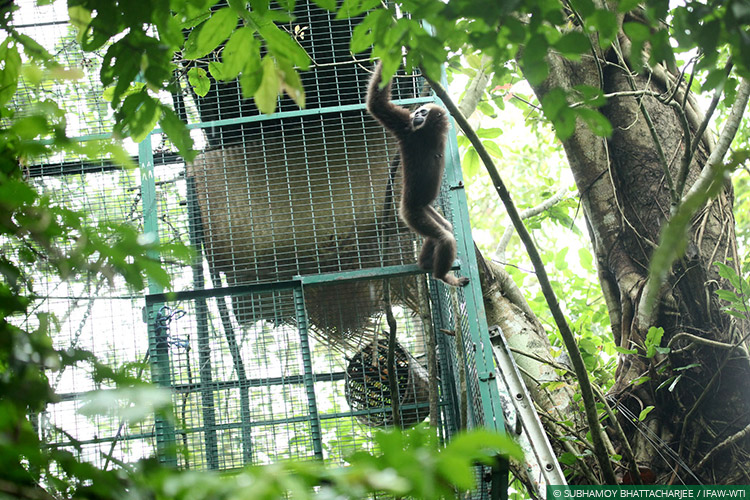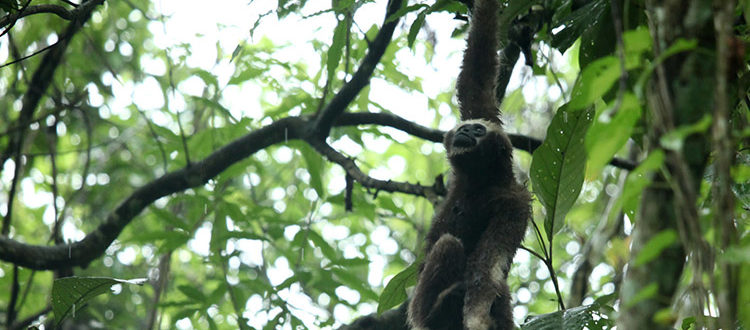Hand-raised at CWRC, Western Hoolock Gibbon Pair Released into the Wild
 ‘Makumi’, hand-raised at CWRC, after having been released from her enclosure and into the Panbari Reserve Forest
‘Makumi’, hand-raised at CWRC, after having been released from her enclosure and into the Panbari Reserve Forest
CWRC, Kaziranga National Park, June 14, 2017: A pair of western hoolock gibbons under long-term care at the Centre for Wildlife Rehabilitation and Conservation (CWRC) – the wildlife rescue, care and rehabilitation facility jointly run by the International Fund for Animal Welfare (IFAW), Wildlife Trust of India (WTI) and Assam Forest Department – was released into the wild in the Kaziranga-Karbi Anglong landscape early yesterday morning.
The gibbons had been at CWRC for a number of years: ‘Makumi’, the female, was rescued as an infant from Makum in the Tinsukia district of Assam in August 2009 while ‘Karbi’, the male, was rescued as an adult by the forest department from Diphu, Karbi Anglong in December 2013. On February 25 this year, as the first step in CWRC’s primate soft release protocol, the veterinary team had shifted the pair to an acclimatisation site in the Panbari Reserve Forest, which is connected to the Karbi Anglong hills and is good gibbon habitat. The animals were both fitted with a silver earring for identification in the wild and were kept in adjoining compartments of a cage high in the forest canopy, able to observe and interact with one another. They were constantly monitored by CWRC veterinarians Dr Panjit Basumatary and Dr Samshul Ali, the centre’s animal keepers, and Bidyut Sarania, a PhD primate researcher from Tezpur University.
The pair had begun vocalising and replying to calls from wild gibbons within a couple of weeks of being shifted to the acclimatisation site. In early May they had their first wild visitor: a male gibbon that had been calling to the pair began visiting them at the cage, expressing a particular interest in ‘Makumi’.
The gibbons spent some time near the enclosures, grooming themselves and experiencing their first heavy rain shower as free apes. Then they moved off into the forest.
A blood panel report received a few days ago declared both “Mr Karbi” and “Mrs Makumi” disease-free. This, coupled with the positive behavioural responses the team had recorded since the gibbons were shifted to Panbari Reserve Forest over 100 days ago, suggested that it was time to let them go free.
With Mukut Das, Assistant Conservator of Forests (Kaziranga National Park) looking on, the CWRC team opened the gates to both enclosures early yesterday morning. ‘Karbi’ emerged within half a minute and while ‘Makumi’ was more tentative, she too exited her enclosure a few minutes later. The gibbons spent some time near the enclosures, grooming themselves and experiencing their first heavy rain shower as free apes. They then brachiated into the forest.
“Both were seen moving through the forest looking for food and shelter”, said Bidyut Sarania, who observed the pair during the course of the day. “The female, ‘Makumi’, was more active in exploring her surroundings.”
“Food collected from the forest will be made available near the release site for the next few days, in case they take shelter in the vicinity”, said Dr Panjit Basumatary, lead veterinarian at CWRC. “It’s always heartening to be able to rehabilitate a wild animal into its natural habitat”, he added. “We will continue to monitor the gibbons closely over the next few months and hope that they adapt successfully to a new life in the wild.”
[acx_slideshow name=”Western Hoolock 14062017″]
A slideshow of the gibbons from the time that they were taken to the pre-release site in February, to their eventual release into the wild









